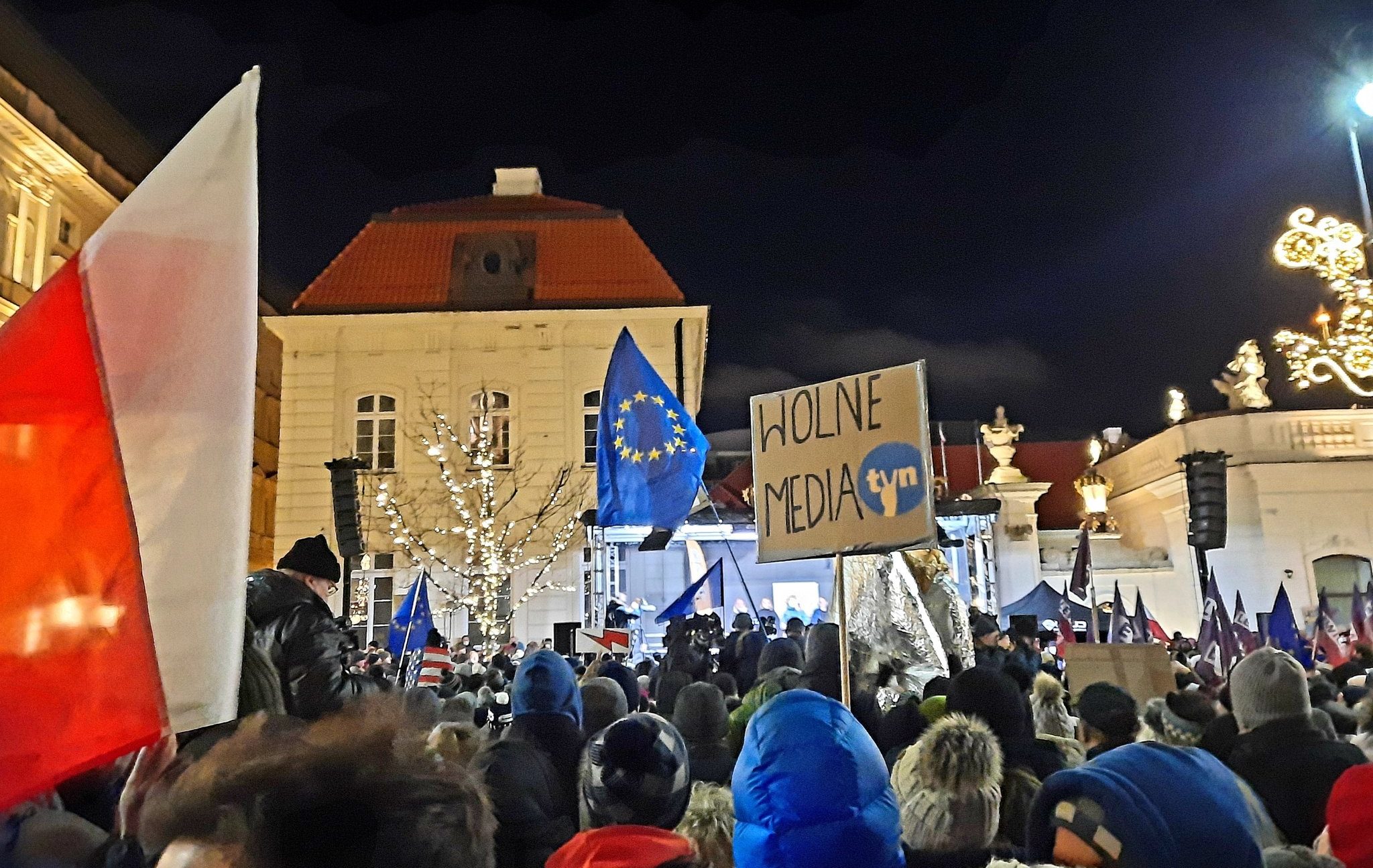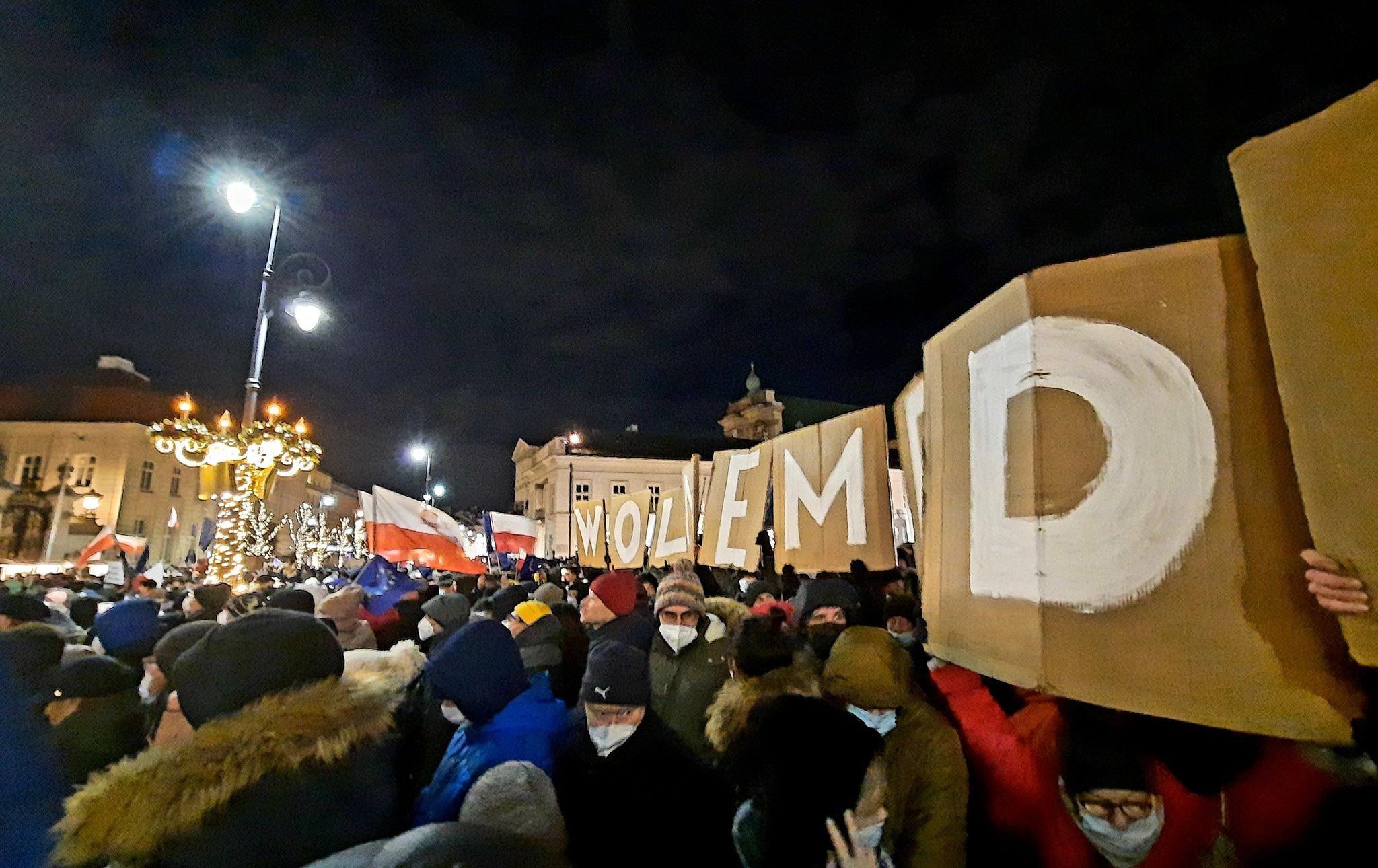Poland: President must reject new media law
20 December 2021
Protests have erupted across the country and there has been international condemnation in response to a bill which, if ratified, would restrict foreign ownership of media companies in Poland.

On Friday, a surprise vote saw the ‘Lex TVN’ bill approved by the Sejm (Poland’s lower house). The law poses grave consequences for Poland’s media landscape, by restricting non-EU ownership of media. While this motive is concerning in of itself, it also has very practical consequences.
If affirmed into law, it will mean US-owned firm Discovery will be forced to sell its majority stake in TVN, one of the country’s largest private broadcasters. It will be a blow to media freedom and independence in the country, with TVN providing independent and critical reporting which holds power to account to the Polish public in a media landscape where such journalism is becoming rarer. It is also feared that the forced sale risks those shares being purchased by government-friendly individuals or companies, which could ultimately impact on TVN’s editorial integrity.
Independent journalist, Dorota Nygren, who was removed from her position as desk editor for Polish Radio in 2017, told PMA how significant this law could be. “The elimination of the private television channel TVN is another step on the road to state capture by one party – after the politicisation of the prosecutor’s office and Constitutional Court, the takeover of the public media, the attempt to take over the courts and the purchase of most regional newspapers by a state-owned company.”
“The act may result in a forced change in the ownership structure of media companies and poses a serious threat to the freedom and pluralism of the media in Poland” – Christian Wigand, spokesperson for the European Commission
She said TVN is crucial for Polish democracy and independent broadcast media, as “Its journalists keep an eye on the authorities and do not hesitate to criticise their abuses.” Otherwise, there is just the public media – “which the government treats as its sphere of influence” – and Polsat television, “which is seen as quite cautious about the current government.”
It has been a convoluted process which has led to this situation. Despite initial approval by the Sejm, the law was struck down by the Senate in September. That brought the bill back to the Sejm, where on Friday it was then passed once again by the ruling party, the Law and Justice Party (PiS). The next stage will see it put on the desk of the President, Andrzej Duda, an ally of PiS, who has the power to veto the law.

The law has caused outrage. Thousands of people turned out at protests organised by the Committee for the Defence of Democracy in more than 130 Polish towns and cities on Sunday. At the demonstration in Warsaw, Donald Tusk – former Prime Minister, former EU President, and current leader of the main opposition party – said “Let’s sweep this power away!” In addition, TVN has created a petition, which argued the law would destroy “mutual relations with the USA, the greatest ally and guarantor of our country’s security”. According to the broadcaster, it now has 2.4 million signatures.
Domestic protests have been matched by international condemnation. The US Ambassador to Poland, Bix Aliu, said they were “disappointed” by the outcome, and the European Commission’s spokesperson, Christian Wigand, addressed the law on Monday. “The vote that took place on Friday puts further pressure on the media sector in Poland,” he said. “The act may result in a forced change in the ownership structure of media companies and poses a serious threat to the freedom and pluralism of the media in Poland. This could lead to a restriction of media freedom in Poland, where the media landscape is already suffering from increasing politicisation.”
The United States is extremely disappointed by today’s passage of the media bill by the Sejm. We expect President Duda to act in accordance with previous statements to use his leadership to protect free speech and business.
— Bix Aliu (@USAmbPoland) December 17, 2021
Discovery has also criticised the latest developments. In a statement posted on TVN24’s website, Discovery Inc. described it as “An unprecedented attack on free media. … This decision is targeting Poland’s biggest and crucial ally, as Poland’s security and a large part of Polish economy rely on the United States. TVN Discovery Group and Discovery Inc. are determined to protect its investments in Poland and will take all available legal steps to ensure the mission of our media in Poland is continued.”
Crucially, the implementation of the law is not guaranteed, with President Duda having previously stated he would not approve the law, due to how it would damage US-Polish relations. President Duda is being urged by many to honour this commitment, but Dorota Nygren said she was not confident he would. “Andrzej Duda is probably thinking about his future after the end of his second term, and this future is inevitably connected with his party, Law and Justice, from which this law came. So far, he has been known only as one who fulfils its will.”
The Public Media Alliance continues to condemn the ‘Lex TVN’ bill and calls upon President Duda to listen to the Polish public and others, and reject it. It goes against the very principles of any free democratic society, in which independent, critical and truth-speaking media are integral.
Related Posts
13th September 2021
Poland: Senate rejects controversial media ownership bill
Bill criticised as a serious threat to…
12th August 2021
Poland: Senate must reject media ownership bill
PMA calls on Poland’s Senate to reject…
1st August 2021
Poland: Anti-foreign media amendment inches closer as TVN24’s licence is suspended
With the suspension of TVN24’s licence…
22nd February 2021
Poland: Advertising tax poses existential threats to independent media
A proposed tax on advertising revenue…

